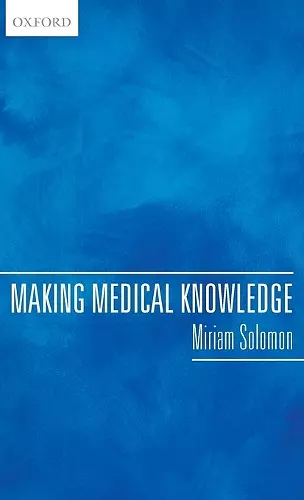Making Medical Knowledge
Format:Hardback
Publisher:Oxford University Press
Published:2nd Apr '15
Currently unavailable, and unfortunately no date known when it will be back
This hardback is available in another edition too:
- Paperback£23.99(9780192872296)

How is medical knowledge made? New methods for research and clinical care have reshaped the practices of medical knowledge production over the last forty years. Consensus conferences, evidence-based medicine, translational medicine, and narrative medicine are among the most prominent new methods. Making Medical Knowledge explores their origins and aims, their epistemic strengths, and their epistemic weaknesses. Miriam Solomon argues that the familiar dichotomy between the art and the science of medicine is not adequate for understanding this plurality of methods. The book begins by tracing the development of medical consensus conferences, from their beginning at the United States' National Institutes of Health in 1977, to their widespread adoption in national and international contexts. It discusses consensus conferences as social epistemic institutions designed to embody democracy and achieve objectivity. Evidence-based medicine, which developed next, ranks expert consensus at the bottom of the evidence hierarchy, thus challenging the authority of consensus conferences. Evidence-based medicine has transformed both medical research and clinical medicine in many positive ways, but it has also been accused of creating an intellectual hegemony that has marginalized crucial stages of scientific research, particularly scientific discovery. Translational medicine is understood as a response to the shortfalls of both consensus conferences and evidence-based medicine. Narrative medicine is the most prominent recent development in the medical humanities. Its central claim is that attention to narrative is essential for patient care. Solomon argues that the differences between narrative medicine and the other methods have been exaggerated, and offers a pluralistic account of how the all the methods interact and sometimes conflict. The result is both practical and theoretical suggestions for how to improve medical knowledge and understand medical controversies.
This is an impressive and important book. It is full of useful examples and case studies from medicine that help to make original points. And many of these points seem to me to be correct: in medicine, there is a plurality of methods, and these methods should be judged on their merits rather than by appealing to a hierarchy of methods. Solomon's historical approach to these issues is a productive way to proceed. It furthers the debate about the strengths and weaknesses of the various methods used in medical research and practice by providing a more complete picture of the relationships between these methods. It is a must-read for anyone interested in the epistemology of medicine or philosophy of science more generally. It is also beautifully written, with clear and informative prose, and concise summaries of the conclusions at regular intervals. * Michael Wilde, British Journal for the Philosophy of Science *
In this accessible, well-written book, Miriam Solomon reviews four interrelated but largely independent methods of medical knowledge production: the consensus conference, evidence-based medicine, translational medicine, and narrative medicine... Solomon's lucid and expert exploration of these four methods of knowledge production provocative and insightful. This book works as a stand-alone assessment of contemporary medical knowledge and as a stimulus for further research. * Stefan Timmermans, Bulletin of the History of Medicine *
Making Medical Knowledge is well written, and Solomon's review of the philosophical arguments behind the ongoing debate about evaluating health technology is clear and insightful ... [a] brilliant book * Michael K. Gusmano, Hastings Center Report *
a fascinating story, and Solomon tells it admirably ... Making Medical Knowledge is a valuable contribution that carefully untangles important epistemic questions in medicine. * Joseph J. Fins, Notre Dame Philosophical Reviews Online *
This research aims to break down barriers. . . to overcome the opposition between art and science. . . and thus produce a clearer picture of the particular epistemic situation that characterizes medical knowledge. * Clement Dréano, www.lectures.revues.org *
Miriam Solomon (philosophy, Temple Univ.) has written an excellent work that explores common methods of creating medical knowledge ... The book is part history and part philosophy, and though Solomon succeeds in both areas, the philosophical and analytical discussions interspersed throughout really stand out and help readers unpack the complexities of each topic. The book is well researched, with plentiful references and footnotes, but does not read in a stereotypically dry, academic way. On the contrary, the book is a pleasure to read. Each chapter is organized into manageable sections, and the index is thorough. This is a well-written, well-organized, and well-constructed book, certainly worth the investment for those interested in any aspect of medicine ... Recommended. * M. P. MacEachern, Choice *
[I]t is erudite, informative, provocative, and repays with interest engagement with its clearly written text and the author's long experience with medical and scientific epistemology. It is a superlative reference for anyone seeking to find out about modern medical epistemology. Philosophers of medicine and science, sociologists, and historians of medicine will find it of particular value. * Miles Little, Kennedy Institute of Ethics Journal *
ISBN: 9780198732617
Dimensions: 222mm x 150mm x 23mm
Weight: 484g
278 pages